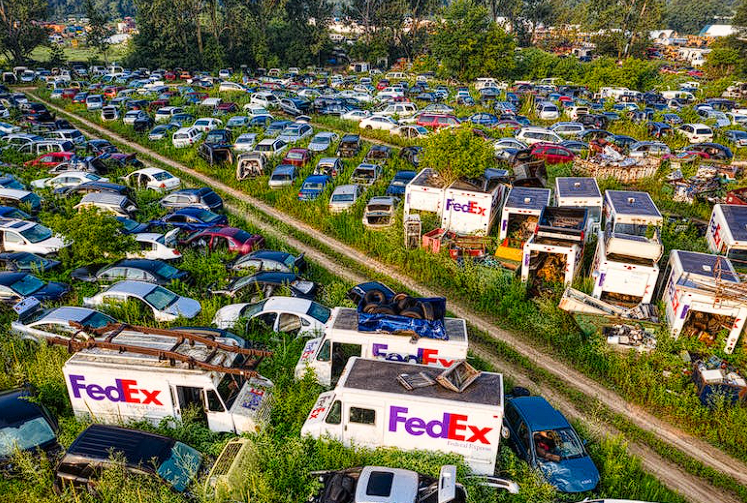Scrap car removal companies play a crucial role in recycling and repurposing end-of-life vehicles, ensuring that even the most worn-out cars are put to good use. When a car is no longer roadworthy, these companies meticulously dismantle it, salvaging reusable parts like engines, transmissions, and electronics, which can be resold or repurposed.
Non-reusable materials, such as metals, are separated and recycled, lowering the demand for fresh raw resources and minimising environmental impact.
Hazardous materials and fluids are disposed of safely, keeping harmful substances out of landfills and ecosystems. Read this blog to learn more about the intricate process and environmental benefits of scrap car recycling!
Let’s get straight to the point
Companies that remove scrap cars are essential to recycling end-of-life vehicles by dismantling them for reusable parts and recycling non-reusable materials, benefiting the environment and economy. The process involves careful inspection, disassembly, fluid drainage, and recycling of valuable components like metals, tyres, and plastics.
Hazardous materials are safely disposed of, preventing pollution. By repurposing parts and materials, these companies reduce landfill waste, conserve natural resources, and support a circular economy. Car owners dispose of unwanted vehicles responsibly and often receive compensation, making scrap car removal a sustainable and profitable solution.
The Importance Of Car Recycling

Recycling cars are essential for environmental protection, resource preservation, and economic growth:
- Reducing Environmental Hazards: Old cars contain harmful fluids like oil, battery acid, and coolant, which can leak into the environment and cause pollution. Recycling cars ensures these substances are disposed of safely, reducing environmental impact.
- Preserving Natural Resources: Vehicles are composed of metal, glass, plastic, and rubber, which can be repurposed. The need for fresh resources is decreased by recycling these items and conserving energy, lowering the demand for new materials.
- Economic Benefits: Car recycling generates jobs and revenue by selling recycled materials. It also helps reduce landfill congestion by keeping scrap cars out, preserving valuable land.
The Car Recycling Process
Scrap car removal companies follow a structured process to recycle vehicles in an environmentally responsible way:
Step 1: Inspection And Evaluation
Upon receiving the car, the company conducts an initial inspection to evaluate its components and identify hazardous materials. This assessment helps determine if the car is suitable for recycling and identifies parts that can be salvaged or reused.
Step 2: Disassembling And Dismantling
In this stage, the car is carefully dismantled, and components like the engine, transmission, and other valuable parts are separated for further processing. The goal is to remove reusable parts efficiently.
Step 3: Fluid Drainage And Recycling
The next step involves draining all fluids, such as oil, fuel, and coolant, to prevent environmental contamination. These fluids are collected and either recycled or disposed of according to environmental regulations, helping reduce pollution risks.
Step 4: Reuse Of Vehicle Parts
Parts still functional or can be repaired are resold in secondary markets or reused in other vehicles. This reduces waste and supplies affordable parts to consumers and repair shops.
Step 5: Metal Recycling
The remaining metal from the car is sorted and processed for recycling. Metals like steel and aluminium are melted down and repurposed for various industries, conserving natural resources and energy.
Step 6: Hazardous Material Disposal
Certain car components, such as airbags, batteries, and mercury switches, are classified as hazardous waste. These items are removed and disposed of following strict guidelines to ensure safety and environmental compliance.
Step 7: Non-Metallic Material Recycling
Non-metal parts, including rubber, plastic, and glass, are also recycled. Rubber parts like tyres are often shredded and reused, while plastics and glass are processed and repurposed in different industries.
Step 8: Disposal Of Remaining Waste
Any materials that cannot be recycled, such as upholstery and certain non-reusable components, are disposed of in an environmentally responsible manner. This minimises waste and ensures proper landfill management.
The Process Of Scrap Car Removal

Services for scrap automobile disposal offer a practical and often profitable way to dispose of an unwanted vehicle. Here's how the process typically unfolds:
- Finding a Car Removal Service: Search online using terms like "free car removal services near me" or "junk car removal." Select reputable companies with positive reviews to ensure a hassle-free experience.
- Selecting the Best Service: Choose companies that offer competitive prices, free towing, and excellent customer service. Verify their services by checking their website or calling them.
- Getting Multiple Offers: Request quotes from several services to understand your car's value. Most companies provide instant offers through their online systems.
- Negotiating the Price: Use these quotes as a basis for negotiation. Given the rising value of scrap materials, many businesses are prepared to pay a reasonable fee.
- Arranging Pickup: Agree on a convenient pickup time and location. Many services offer flexible schedules to suit your needs.
- Receiving Payment: Most scrap car removal services provide immediate cash payments. Confirm the payment method upfront to avoid misunderstandings.
Most Recyclable Parts Of A Car
Certain parts of a car are more commonly recycled due to their material and utility:
- Tyres: Made from steel, rubber, and nylon, tyres can be repurposed into new or rubber products.
- Plastic Components: Parts like bumpers and interior trims are recycled into new plastic products.
- Aluminium: Found in engine blocks, wheels, and transmissions, aluminium is highly recyclable.
- Steel and Iron: These metals are extensively recycled and form the bulk of a car's weight.
- Copper: Copper is used in radiators, is copped valuable and is easily recyclable.
Environmental Benefits Of Car Recycling
Recycling cars offers multiple environmental benefits:
- Reducing Vehicle Pollution: Recycling prevents toxic materials from leaking into the environment, reducing the pollution caused by abandoned vehicles.
- Natural resource conservation: By lowering the demand for virgin materials like metal ores, recycling protects natural habitats and reduces pollution from mining activities.
- Minimising Landfill Waste: Scrap cars in landfills occupy valuable space and increase pollution levels. Recycling reduces this burden on landfills.
- Supporting a Circular Economy: Car recycling is a key component of the circular economy, where waste is minimised, and materials are continuously repurposed, promoting sustainable practices.
Conclusion
Scrap car removal companies provide a valuable service for those looking to dispose of their old cars in an environmentally responsible manner. By recycling vehicles, these companies help reduce landfill waste, conserve natural resources, and support the circular economy.
Through efficient processes that ensure safe disposal and recycling, car owners can get rid of unwanted vehicles without harming the environment and receive financial compensation.
Frequently Asked Questions
Scrap car removal companies can recycle various types of cars, including old or damaged, end-of-life, salvaged, and even abandoned ones.
The fluids and hazardous materials, such as oil, coolant, brake fluid, and batteries, are carefully drained and collected during de-pollution. These materials are then disposed of or recycled properly in compliance with environmental regulations.
Scrap car removal companies must adhere to local, state, and federal regulations related to handling, transporting, and disposing of hazardous materials and obtaining appropriate permits and licences to operate their recycling facilities.
The crushed and sorted metal parts are sold to metal mills and foundries, where they are melted down and used to manufacture new products, including new cars, appliances, and construction materials.
If your engine is completely scrap, a recycling specialist will extract the raw materials and metal to be melted down and used to make new products. Aluminium is especially useful when recycling because it does not deteriorate significantly when melted. Other engines can be reconditioned or remanufactured.

